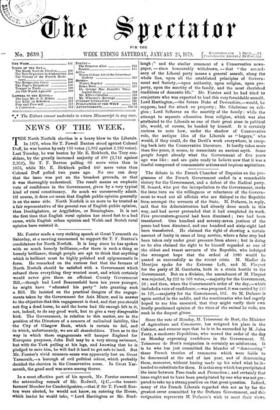The debate in the French Chamber of Deputies on the
pro- gramme of the French Government ended in a remarkable victory for the Government, and a defeat of the Radical party. M. Senard, who put the interpellation to the Government, made the issue turn on the willingness or reluctance of the Govern- ment to weed out all officials who are disloyal to the Republic from amongst the servants of the State. M. Dufaure, in reply, said that his Administration had already done much in this way, and had never pretended that it had completed its work. Five procurators-general had been dismissed ; two had been transferred. One hundred and seventy-seven justices of the peace had been dismissed, and one hundred and sixty-eight had been transferred. He claimed the right of showing a certain amount of lenity in cases of long service, where a false step had been taken only under great pressure from above ; but in doing so he also claimed the right to be himself regarded as one of the oldest and truest servants of the Republic, who indulged the strongest hope that the ordeal of 1880 would be passed as successfully as the recent crisis. M. Madier de Montjau spoke for the Extreme Left, and M. Floquet for the party of M. Gambetta, both in a strain hostile to the Government. But on a division, the amendment of M. Floquet was rejected, by 222 to 168 votes,—majority for the Government, 54; and then, when the Government's order of the day,—which included a vote of confidence,—was proposed, it was carried by 223 to 121,—majority for the Government, 102. So M. Dufanre is again settled in the saddle, and the reactionaries who had eagerly hoped to see him unseated, that they might verify their own loudly proclaimed opinion of the vices of the animal he rode, are sunk in the deepest gloom.


































